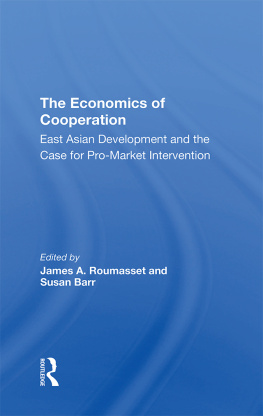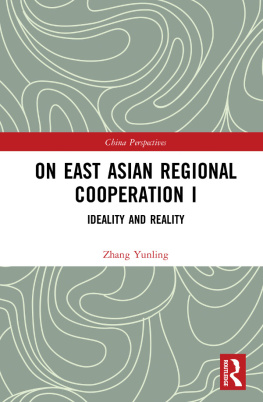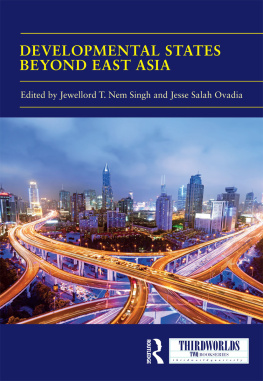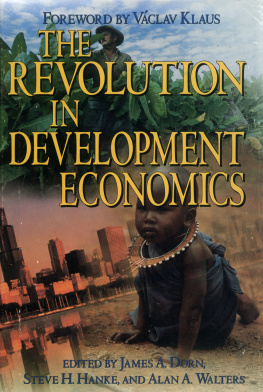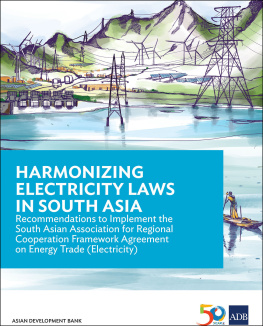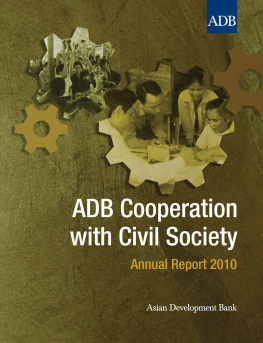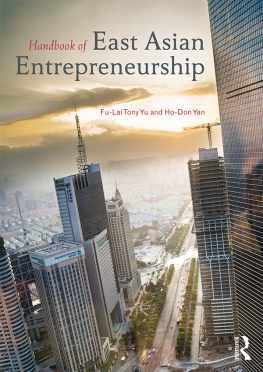The Economics of Cooperation East Asian Development and the Case for Pro-Market Intervention
The Economics of Cooperation
East Asian Development and the Case for Pro-Market Intervention
Edited By
James A. Roumasset and Susan Barr
First published 1992 by Westview Press, Inc.
Published 2019 by Routledge
52 Vanderbilt Avenue, New York, NY 10017
2 Park Square, Milton Park, Abingdon, Oxon OX14 4RN
Routledge is an imprint of the Taylor & Francis Group, an informa business
Copyright 1992 Taylor & Francis
All rights reserved. No part of this book may be reprinted or reproduced or utilised in any form or by any electronic, mechanical, or other means, now known or hereafter invented, including photocopying and recording, or in any information storage or retrieval system, without permission in writing from the publishers.
Notice:
Product or corporate names may be trademarks or registered trademarks, and are used only for identification and explanation without intent to infringe.
A CIP catalog record for this book is available from the Library of Congress.
ISBN 13: 978-0-367-29151-8 (hbk)
Contents
, James A. Roumasset
, Joseph E. Stiglitz
, Brian D. Wright and David M. G. Newbery
, Robert E. Evenson
, Sumner J. La Croix
, Ira W. Lieberman
, Louis Putterman
, Mukesh Eswaran and Ashok Kotwal
, Chung H. Lee
, Keizo Nagatani
Guide
The role of government in market economies has been at the core of economics since Adam Smith wrote The Wealth of Nations. As we move toward the "Pacific Century," this question has been given renewed impetus. The success of East Asian economies in the face of extensive government involvement in the economy has called into question the free-market slogan "privatize and get the prices right." Even in the U.S., there is increasing interest in having an industrial policy, not to direct commerce but to facilitate cooperation in increasing global competitiveness. Socialist countries seeking to liberalize their economies are now asking how government policies can best align private incentives in order to decentralize economic cooperation. In an effort to contribute to the better understanding of these issues, studies of investment coordination in the Asia-Pacific region were undertaken which have, in turn, given rise to the present volume.
We wish to thank President Albert Simone, former Vice President Anthony J. Marsalla, the School of Hawaii, Asian and Pacific Studies and the Department of Economics of the University of Hawaii for helping to sponsor the discussion of these issues. Special thanks to Cynthia Wood for her creativity and patience in the technical editing and electronic typesetting of this volume, Trent Bertrand, Christopher Clague, James Mak, Seiji Naya, Calla Weimer, and Raeburn Williams for helpful discussions and Lee Endress for comments on a previous draft, and Benton and Brian Roumasset for their inspiration and good cheer.
James A. Roumasset
Susan Barr
1
Introduction: The Role of Government in Economic Development
James A. Roumasset
Economists have long been divided, in formulating policy advice, along the lines of the political right and left. Economists leaning towards the left have advocated government intervention as a corrective for a wide variety of market failures and to correct the allegedly unjust distribution of income that results from capitalism. Politically "right" economists have resisted such intervention, arguing that so-called market failures could be more effectively managed by voluntary action than by coercive government edicts. These "free market" economists also maintain that justice is more a matter of protecting liberty than taking from the rich and giving to the poor.
In this contrast between the economics of the right and left, government intervention is assumed to be anti-market, and the promotion of markets is thought to be anti-government. "Pro-market government intervention" thus sounds like a contradiction in terms.
A number of recent developments have contributed to a challenge to the conventional government versus market paradigm. First, there has been a widespread disillusionment with the ability of government planning to replace voluntary exchange. Discussion of "government failure" has become commonplace. Journalists as well as economists speak of the "iron triangle" between government bureaucracy, lawmakers and special interests in the private sector. The iron triangle tacitly colludes to establish regulations, economic policy, and public programs that redistribute income towards the influential coalition instead of promoting the common good. At the same time, the market success stories of Japan, Korea and Taiwan appear to have been stimulated and accelerated by government facilitation. Apparently, government intervention does not necessarily detract from economic development.
The theory and practice of economic planning has traditionally focused on the amount and composition of government spending and on "picking the winners," choosing new products that the government will promote in order to stimulate economic growth. An alternative view is that government policy should be focused on improving the performance of private markets, i.e. that government intervention should be "pro-market." In order to explore further the role of government in promoting economic development, this chapter begins with a review of the role of government policy in the theory of economic development. The next two sections explore lessons for the role of government that are suggested by recent development success stories in East Asia. The last sections provide an overview of the rest of the book.
The Evolution of Development Theory
Economic development theory has undergone a number of stages of fad and fancy in the last 30 years. Economic planning and development policy prescription have correspondingly swung from one panacea to another. It has not always been clear whether the policy-makers were following the ideas of economics or whether the economic ideas that became popular were those that rationalized what policy-makers wanted to do. In any case, it is time to take stock. What have we learned about government's role in economic development? What do lessons about the development of Asia suggest about the role of government?
In the 1960s, the predominant strategy for economic development was to transfer resources from the "backward" and "traditional" agricultural sector to the modern manufacturing sector. Popular policy instruments for effecting the resource transfer were tariff and non-tariff barriers against foreign competition, credit subsidies and other fiscal incentives.
The experience of the 1950s and 60s in many developing Asian countries suggests that subsidizing import-substitution does indeed lead to an initial period of rapid manufacturing growth but only in the finishing stage of the industry (e.g. assembly). Since protection of one economic activity indirectly discriminates against other activities and sectors, the initial period of growth is followed by stagnation. Forward and backward integration, diversification, export promotion are all stifled by the very policies conceived to stimulate growth.
In response to this experience, the 1970s witnessed a change to a new strategy. International development agencies such as the World Bank dubbed the 70s as the "employment decade." Developing countries were encouraged to invest in promoting new agricultural technology, and to build infrastructure such as bridges, roads, communication facilities, electrification and irrigation works. Governments also invested in subsidizing agricultural inputs, rural credit, land reform, crop insurance and other programs designed to compensate for perceived inefficiencies of the private sector.


